I went for an SMT solver as suggested by @harold. Specifically the CVC4 SMT Solver. Here is the code I've written in C++ answering my question about finding the 16 solutions (w[0...15]) for a system of 8 equations, constrained to be ascii characters. I have one last question though. What are pushing and popping for? (slv.push() and slv.pop())
#include <iostream>
#include <cvc4/cvc4.h>
using namespace std;
using namespace CVC4;
int main() {
// 1. initialize a CVC4 BitVector SMT solver
ExprManager em;
SmtEngine slv(&em);
slv.setOption("incremental", true); // enable incremental solving
slv.setOption("produce-models", true); // enable models
slv.setLogic("QF_BV"); // set the bitvector theory logic
Type bitvector8 = em.mkBitVectorType(size_8); // create a 8-bit wide bit-vector type (4 x 8-bit = 32-bit)
// 2. create the SMT solver variables
Expr w[16][4]; // w[0...15] where each w corresponds to 4 ascii characters
for (int i = 0; i < 16; ++i) {
for (int j = 0; j < 4; ++j) {
// a. define w[i] (four ascii characters per w[i])
w[i][j] = em.mkVar("w" + to_string(i) + to_string(j), bitvector8);
// b. constraint w[i][0...3] to be an ascii character
// - digit (0-9) constraint
// ascii lower bound digit constraint (bit-vector unsigned greater than or equal)
Expr digit_lower = em.mkExpr(kind::BITVECTOR_UGE, w[i][j], em.mkConst(BitVector(size_8, Integer(48))));
// ascii upper bound digit constraint (bit-vector unsigned less than or equal)
Expr digit_upper = em.mkExpr(kind::BITVECTOR_ULE, w[i][j], em.mkConst(BitVector(size_8, Integer(56))));
Expr digit_constraint = em.mkExpr(kind::AND, digit_lower, digit_upper);
// - lower alphanumeric character (a-z) constraint
// ascii lower bound alpha constraint (bit-vector unsigned greater than or equal)
Expr alpha_lower = em.mkExpr(kind::BITVECTOR_UGE, w[i][j], em.mkConst(BitVector(size_8, Integer(97))));
// ascii upper bound alpha constraint (bit-vector unsigned less than or equal)
Expr alpha_upper = em.mkExpr(kind::BITVECTOR_ULE, w[i][j], em.mkConst(BitVector(size_8, Integer(122))));
Expr alpha_constraint = em.mkExpr(kind::AND, alpha_lower, alpha_upper);
Expr ascii_constraint = em.mkExpr(kind::OR, digit_constraint, alpha_constraint);
slv.assertFormula(ascii_constraint);
}
}
// 3. encode the 8 equations
for (int i = 0; i < 8; ++i) {
// a. build the multiplication part (index * w[i])
vector<Expr> left_mult_hand;
for (int j = 0; j < 16; ++j) {
vector <Expr> inner_wj;
for (int k = 0; k < 4; ++k) inner_wj.push_back(w[j][k]);
Expr wj = em.mkExpr(kind::BITVECTOR_CONCAT, inner_wj);
Expr index = em.mkConst(BitVector(size_32, Integer(m_unknowns[j])));
left_mult_hand.push_back(em.mkExpr(kind::BITVECTOR_MULT, index, wj));
}
// b. sum each index * w[i]
slv.push();
Expr left_hand = em.mkExpr(kind::BITVECTOR_PLUS, left_mult_hand);
Expr result = em.mkConst(BitVector(size_32, Integer(globalSums.to_ulong())));
Expr assumption = em.mkExpr(kind::EQUAL, left_hand, result);
slv.assertFormula(assumption);
// c. check for satisfiability
cout << "Result from CVC4 is: " << slv.checkSat(em.mkConst(true)) << endl << endl;
slv.pop();
}
return 0;
}

 :
:

